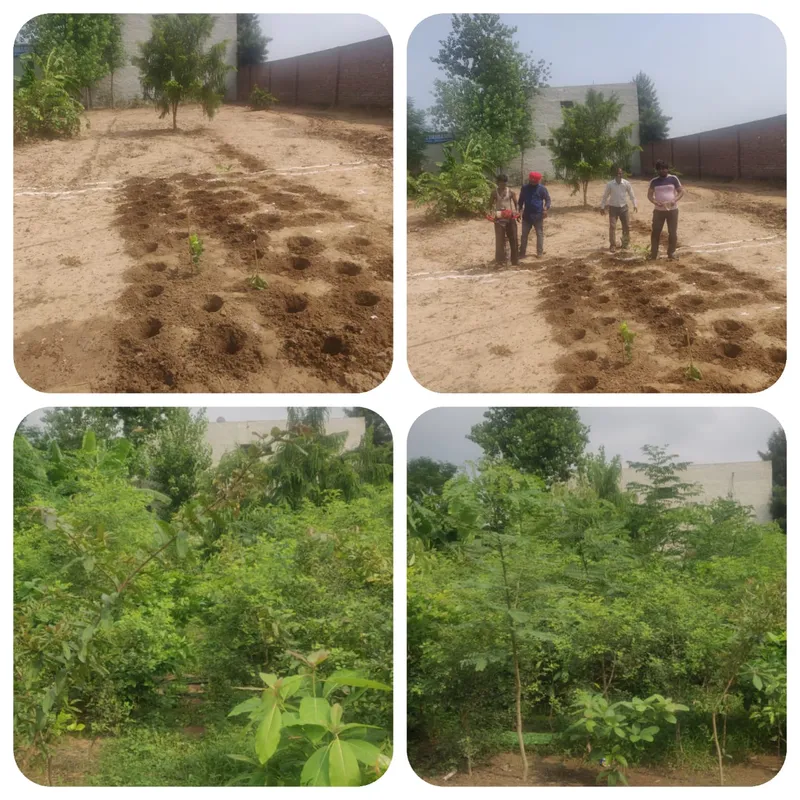Meet the IRS officer who is on a mission to make the world a greener place to live in
The ‘Green Man of India’, Rohit Mehra’s aim is to give back to mother Earth with his various initiatives - from building vertical gardens with single-use plastic to creating a hospital for trees.
“Failure is the stepping stone for success,” can never be a cliché. There are instances where people have failed many times, only to try harder and achieve success.
IRS officer Rohit Mehra’s life has been no different. The “green man of India” whose mission of sustainability has inspired millions in India, actually failed his Grade 12 exams. However, he persisted and went on not only to clear his board exams but to also pass the civil services in 2004 with flying colours.
After many years of working as a civil servant, Rohit decided to dedicate a part of his life working towards sustainability and the environment.
“I wanted to bring change in society. My philosophy is that instead of reacting, we need to act. If I see something wrong, I want to make a change,” says the IRS officer, who is also fondly called, “The Green Man of India".
In his childhood, Rohit says his grandfather encouraged him to grow plants, but he did not take up the activity with much interest.
In 2016, Rohit’s son told him that he had a day off from school because of “pollution”. They were living in Ludhiana, which had a very high AQI at the time.
Rohit was shocked to learn that as a parent, he couldn’t even ensure clean air for his child. “I knew this needed fixing immediately and started working on it.”

Rohit Mehra and his family
With the help of his wife Geetanjali and his children, he started working on five different projects to develop cities including Ludhiana, Amritsar, Baroda, Delhi, Kolkata, among others, and make them greener places to live in.
In just 4.5 years, Rohit has created vertical gardens with plastic bottles, built lush green forests in dump yards, and rightly earned his name as the ‘Green Man of India’.
Rohit’s efforts are primarily supported by his wife and children, and others who believe in the cause. Whenever he visits a place, he manages to convert people to contribute towards his green mission and by making them his “green friends”, thereby forming a circle of giving and receiving.
Vertical gardens for beauty and safety
One of the first projects Rohit undertook addressed two major concerns - the need for clean air and a plastic-free environment. And for this, he found single-use plastic bottles as an excellent resource.
“We used plastic bottles as containers for various plants and created about 500 vertical gardens in various parts of the country,” says Rohit.
In fact, one of the vertical gardens at the Income Tax Department premises at Ludhiana’s Rishi Nagar was recognised by the Limca Book of World Records as the largest in the country. The garden has used around 17,000 plastic bottles.

Mehra with one of his vertical gardens
Plastic bottles are sourced from school students, scrap dealers, and other places. “We ask the students to bring at least two plastic bottles from their homes. So, 300 students can give us 600 bottles,” he says.
He has also created these gardens at the Golden Temple in Amritsar, at railways stations, police stations, judicial complexes and even some of the IITs - all of them made from recycled plastic bottles.
Apart from places in Punjab, Rohit’s gardens are all over Delhi, Gurugram, Surat, Vadodara, Jammu, Mumbai, Kolkata, and some parts of Odisha as well. All these projects have been done free of cost. Rohit considers his efforts as a way of giving back mother earth.
Seed balls everywhere

Seed balls in the making
Rohit has also introduced the concept of “seed balls” – seeds wrapped in clay enriched with nutrition for its growth. These are thrown around wherever free space is available so that they can sprout into plants. Rohit and his family have distributed them at langars, rath yatras, and at a number of events.
“We also stood at toll plazas, distributed these seed balls for free, and encouraged people to plant them,” says Rohit.
Social media for good
“As a person with many contacts, I must say I receive quite a few ‘good morning’ forwards on a daily basis. While clearing these messages is quite tedious, it gave me an idea,” says Rohit.
“I asked every person who wished me in the morning to plant five trees, and send me a picture with it. Out of the 130 odd people who messaged me, at least 92 of them complied and actually planted trees,” he adds
Every time someone sent him the picture, he would upload it on his social media handle and tag them. Seeing this, more people started sharing pictures after planting trees.
Rohit says that about a thousand people have engaged in this activity so far, including an elderly man who also wanted to be recognised at the age of 76 for participating in a noble cause.
Creating jungles
Rohit and his team also decided to clear dump yards and convert them into lush green forests using vrikshayurveda, or the ‘Science of Plant Life’. The process involves the nurturing of plants and allows the control of plant diseases without the use of any chemicals. He also converted the empty and unused plots into forests as well.

One of the forests (before and after)
“Within a year of starting this initiative, we saw trees grow to a height of more than 17 feet. In fact, you cannot even pass through it. This came to the notice of organisations like the National Green Tribunal (NGT), who roped me in for another project. We are converting the Buddha Nullah river into another green forest,” Rohit says.
(The Buddha Nullah river flows through the Malwa region of Punjab and is said to be one of the poisonous water bodies in the country. The NGT has taken over cleaning and has requested for a permanent solution.)
In a span of four years, Rohit has created more than 83 such jungles, out of which at least 50 in Amritsar, Ludhiana, Kolkata, Baroda, Jagraon, and Mullanpur are covered in swathes of green.
Hospital for plants
Recently, Rohit also opened a hospital and ambulance for trees and plants. Here’s how it works -
Rohit works with a team of 25 volunteers including botanists, geologists, IFS officers, ayurvedacharyas and others to address queries on plant diseases and offer solutions.
He says that in the first three days, the team received over 325 calls.
A rickshaw has also been converted into a hospital that stocks all necessary plant medication. “We provide about 33 kinds of services like removing nails on trees, tree guards, additional growth, transplantation services, etc,” he adds
While this service is available only in Amritsar at present, Rohit plans to expand it to other cities as well.

Tree ambulance and hospital
Spreading the message
So far, Rohit has refrained from raising funds for his different initiatives. But he does encourage people to donate plants.
During the pandemic, Rohit took the opportunity to create more eco-warriors to aid his mission. He conducted online classes to teach people how to make seed balls, and how to lead a sustainable lifestyle.
Apart from his green work, Rohit is also the author of Super Child - a book on parenting, with another on the way.
By the end of 2021, Rohit wants to create at least a thousand jungles or ‘oxygen chambers’ across India.
“I want to motivate people and make them understand that the trees are our ancestors and our survival and existence depends on them. So they have to be nourished and protected if want a cleaner, greener and better world for our children,” he says.
Edited by Rekha Balakrishnan








